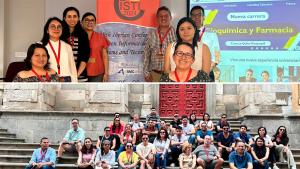Universities presented the book: "Salud, Interculturalidad y Buen Vivir"
Universities presented the book: "Salud, Interculturalidad y Buen Vivir"
Universidad Politecnica Salesiana (UPS) and Universidad de Cuenca (UCuenca) presented the book "Salud, Interculturalidad y Buen Vivir", published by the Abya Yala Publishing House. The book has eleven chapters written by 16 researchers and experts from Ecuador, Italy and Portugal who work in our country.
The book, coordinated by researchers Andrea De Santis (UPS) and Adriana Verdugo (UCuenca) is made up of three parts: "Society and the search for the common good", "Science, technology and ancestral wisdom: cases of research applied to the Ecuadorian context" and "Case studies: Medicine and culture, traditional and conventional ".
Javier Herrán, UPS president and author of the first chapter, gave a welcoming speech and took the opportunity to propose a new joint work under the name of Cuenca Ciudad Universitaria, which also involves the other universities in the city
Pablo Vanegas, president of Universidad de Cuenca, explained how having places to discuss several issues between different people is the best way to demonstrate tolerance, respect, difference and even liberty.
Comments on the book were made by Tamara Landivar, coordinator of the Ministry of Culture and Director of the Pumapungo Museum and Archaeological Site. She stated that the book is an example and significant contribution in the processes of intercultural dialogue, which stars the social being in the 21st century. She invited everyone to read the book and to feel identified with 11 authors.
To conclude, Victoria Jara, coordinator of the GICEA Research Group and professor at UPS, on behalf of the authors, said that the book collects experiences, reflections and extensive research involving international patents, projects with vulnerable groups, ancestral knowledge and the great capacity of universities to work in favor of our society.
With this book, the participating institutions expressed their commitment to interculturality by promoting its conjugation with the integral formation of future generations, and the commitment to continue reflecting on the issue in relation to university practice and work.





Follow us
Follow us